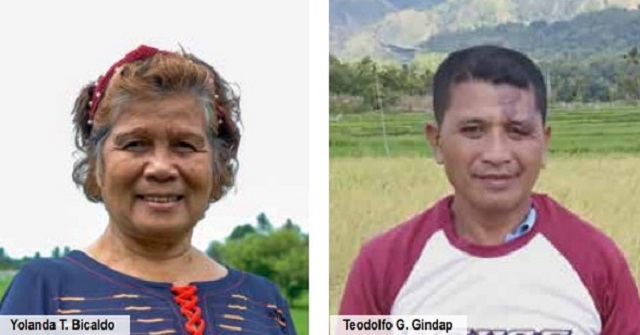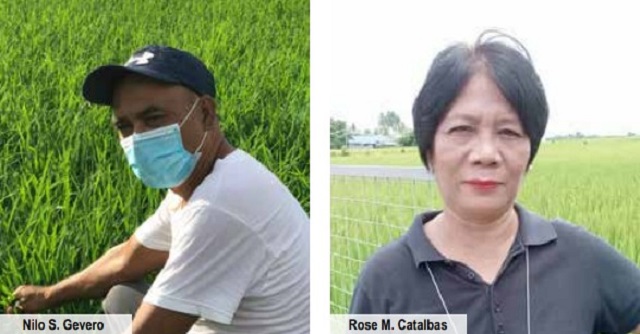Our battlecry for rice security is not a no-contest bout! We must overcome challenges that come along the way. For one thing, in 2019 the country replaced import limits with tariffs that intensified foreign competition for our local rice farmers.
To weather these challenges, collaborative efforts and support are essential. This is why a cooperative exists – to extend members a helping hand and help make them stronger and resilient. A number of coop members across the country testify on their pleasant experiences:

YOLANDA T. BICALDO
69, Camambugan, Libmanan, Camarines Sur, Check Farmers Producers Cooperative (CFPC)
“Cooperatives provide a big help in community development, more so in palay production,” the retired government employee now president of CFPC said.
As a farmer, Bicaldo felt the need for a resilient coop, especially in a community that is frequented by typhoons. She has thus far increased the number of active farmer-members from 30 to 46 and counting. She also assured that all of their members are RSBSA-listed, making them qualified for the support from the Rice Competitiveness Enhancement Fund (RCEF).
“Being a member of a cooperative makes you steadfast,” said Bicaldo.
Members build confidence in selling their produce at a better price. During the 2020 dry season, CFPC’s members were able to sell their milled rice at P2,500 per 50kg sack of the NSIC Rc 160 variety.
The variety basically commands a higher price for its premium eating quality but through partner-establishments, coop members can sell it at an even better price.
“Cooperatives are channels that bring the government closer to the people,” the farmer-accountant maintained.
Bicaldo expressed her gratitude for the support and subsidies provided through the Coop including free inbred rice seeds and fertilizers, which encourage farmers to enlist in their organization.
“To those who are not yet members, I enjoin all of you to become one. This is for you to enjoy the benefits from the government. If we are organized, we become stronger and our voices are louder,” she encouraged.
For Bicaldo, as they get more of the government’s support through the RCEF programs, farming will become a happy experience even more.
TEODOLFO G. GINDAP
50, Magtulis, Barbaza, Antique Barbaza Multi-Purpose Cooperative
Being a coop member since 2004, Gindap has always felt empowered by the services they are provided with, such as affordable crop production loans that they can avail of anytime. The loan amount can even get higher if a member pays on time.
“It is crucial to be in a cooperative especially in times when we are financially short. Applying for loans in most lending companies and even in the government takes time and has a lot of requirements. Other lenders don’t even trust farmers and look down on us. But the cooperative always gives you a chance, especially when you face unexpected problems like the drop of palay prices in 2019” Gindap recalled.
For Gindap, the Coop is a safe haven in times of need that always helps him grow. “You just have to be disciplined and active to make the trust mutual,” he concluded.

NILO S. GEVERO
52, Liton, Kabacan, North Cotabato Liton Free Farmers’ Cooperative (LFFC)
Gevero has been a cooperative member for more than 10 years, the last 6 years of which as LFFC president. For him, being in a coop shaped him to become a better farmer and a leader at the same time.
“A cooperative is very helpful when it is well-managed. In LFFC, we think of strategies to strengthen the services we offer. It is our goal to empower our members,” said Nilo.
During the Rice Tariffication Law (RTL) implementation, LFFC immediately tapped the National Food Authority (NFA) to buy palay from them so their members can still cope. While it was initially reported that prices of fresh palay dropped to P10/kg that time, the Coop still bought dry palay from farmer-members at P18/kg because they sold it to the NFA at a higher price.
“Also, 30% of the farmer’s profit is directly deposited to his capital share. He benefits from a higher price and even grows his capital share, a double gain,” he added.
Gevero contends that it is important to think about how to make his fellow farmers competitive especially in times of transitions.
“I always brief my members on the government services. I make sure that they are RSBSA-covered so they can avail of these services like those from RCEF. We also conduct an annual general assembly where we spare cash, rice, and some merchandise from the coop’s income. This engages them and makes us more united,” he said.
“You should be a member of a cooperative because it will help you in many ways especially in times of crisis and market change. Moreover, it will develop your personality, improve your social skills, and make you more hopeful for the future,” Gevero advised.
ROSE M. CATALBAS
61, Barcenaga, Naujan, Oriental Mindoro, Oriental Mindoro Seedgrower and Multi-Purpose Cooperative
A newbie in rice farming, Catalbas testifies that the Coop helped hone her to be a competitive farmer and businesswoman.
Said Catalbas, being a member of a coop easily links a farmer to the government for services intended for them. Members also discuss their farm experiences so they can exchange ideas with each other. Free training is also provided.
“Alone, it’s harder to access information and requirements are more tedious,” Catalbas said.
She also vouched that the Coop helped boost her credibility and integrity selling her harvest.
“When you are still starting, it’s hard to establish yourself. It’s difficult to market and sell your products. The Coop will help you become credible so buyers will trust and patronize your products. With the Coop’s network, someone is already waiting for your products,” Catalbas reiterated.
In addition, the Coop automatically secures 10% of a member’s profit to his personal savings called Balik Tangkilik. Annually, the accumulated money is declared to them in a general assembly.
“They say no man is an island! The same is true in farming, it’s hard to stand alone, and you cannot compete alone. You need a team to help you succeed. A cooperative will do just that − they will lift you and together you take home the windfall,” ensured Catalbas.




